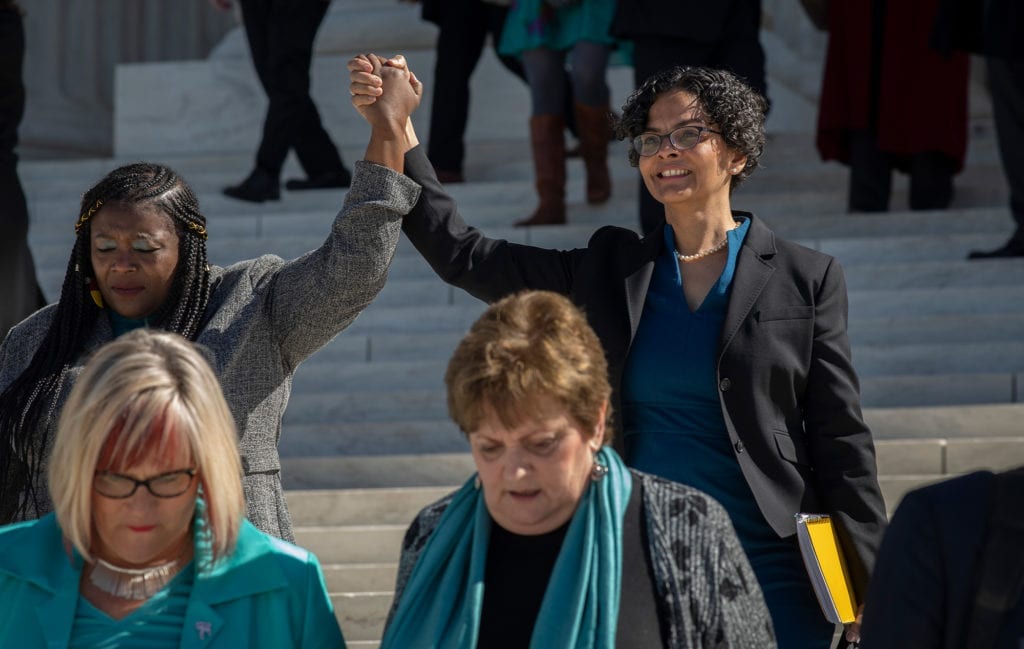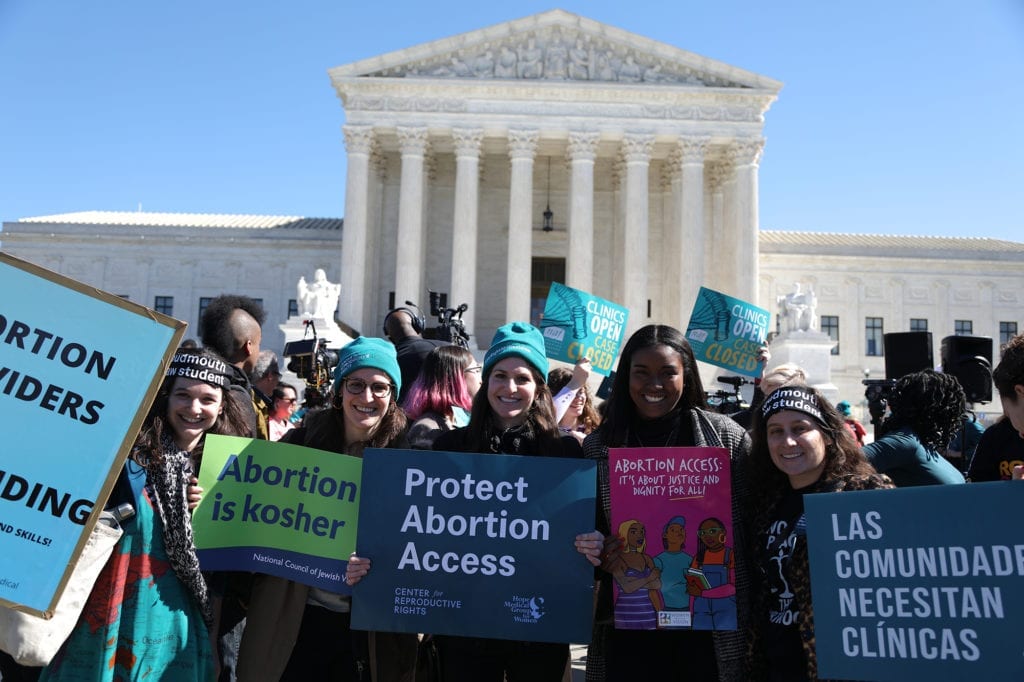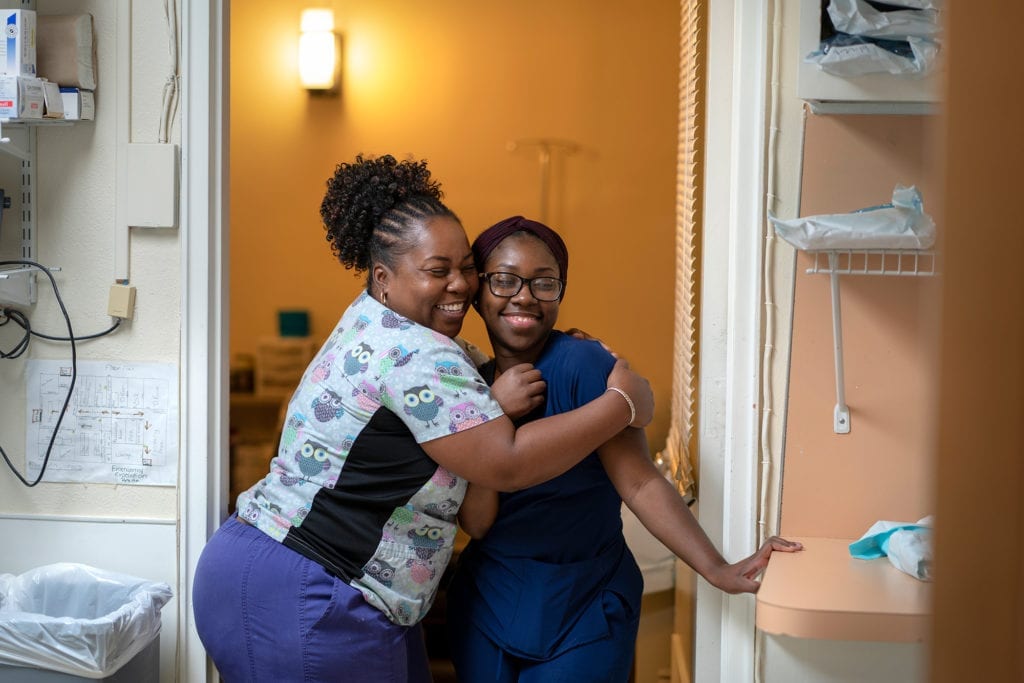June Medical Services v. Russo
Victory at the U.S. Supreme Court!
In June Medical Services v. Russo, the Supreme Court strikes down Louisiana abortion law and follows precedent protecting abortion rights.
9-15-20 Update: Read the Center’s analysis of this decision here.
6.29.20 — Today, the U.S. Supreme Court struck down a Louisiana abortion restriction, following long-held legal standards protecting abortion rights and access. The ruling allows the state’s three remaining abortion clinics to stay open and continue to provide care.
The 5-4 victory in June Medical Services v. Russo marked the second time in four years that the Center for Reproductive Rights challenged an abortion restriction at the Supreme Court and won. The Louisiana law overruled is identical to the Texas law the Court declared unconstitutional in the 2016 case, Whole Woman’s Health v. Hellerstedt.

“This is a big win that vindicates what we’ve said all along, which is that the Louisiana admitting privileges law is unconstitutional,” said Nancy Northup, President and CEO of the Center. “This is a victory for the people of Louisiana and the rule of law, but this case never should have gotten this far. We won an identical case four years ago in Whole Woman’s Health v. Hellerstedt, and the fact that we had to fight so hard again goes to show that nothing should be taken for granted when it comes to protecting abortion rights.” Read Northup’s full statement on the June Medical Services v. Russo decision here.
June Medical Services v. Russo is the first major abortion case decided by the Court since Whole Woman’s Health v. Hellerstedt.
Breyer’s Opinion for the Plurality and Roberts’ Concurrence
In writing for a plurality of the Court, Justice Stephen Breyer wrote, “This case is similar to, nearly identical with, Whole Woman’s Health. And the law must consequently reach a similar conclusion. Act 620 is unconstitutional. The Court of Appeals’ judgment is erroneous. It is Reversed.”
With respect to the legal standard, Breyer wrote, “We apply the constitutional standards set forth in our earlier abortion-related cases, and in particular in Casey and Whole Woman’s Health.” Applying that line of precedent to the facts of this case, the plurality found “We have examined the extensive record carefully and conclude that it supports the District Court’s findings of fact. Those findings mirror those made in Whole Woman’s Health in every relevant respect and require the same result. We consequently hold that the Louisiana statute is unconstitutional.”
Breyer’s opinion in June Medical Services was joined by Justices Ruth Bader Ginsberg, Elena Kagan, and Sonia Sotomayor.
“This case is similar to, nearly identical with, Whole Woman’s Health. And the law must consequently reach a similar conclusion. Act 620 is unconstitutional. The Court of Appeals’ judgment is erroneous. It is Reversed.” Justice Stephen Breyer
Justice John Roberts concurred in judgment based on the Court’s precedent in Whole Woman’s Health. He wrote, “Stare decisis instructs us to treat like cases alike. The result in this case is controlled by our decision four years ago invalidating a nearly identical Texas law. The Louisiana law burdens women seeking previability abortions to the same extent as the Texas law, according to factual findings that are not clearly erroneous. For that reason, I concur in the judgment of the Court that the Louisiana law is unconstitutional.”
While following the Court’s precedent, Roberts also reiterated his opposition to that earlier decision: “I joined the dissent in Whole Woman’s Health and continue to believe that the case was wrongly decided. The question today however is not whether Whole Woman’s Health was right or wrong, but whether to adhere to it in deciding the present case.”
Commenting about today’s decision, Northup said, “Indeed, the Court did not speak with a clear majority opinion which could muddy the waters when clarity is needed to protect abortion rights.”

Decision Adheres to Critical Precedents
In today’s June Medical Services decision, the Court followed the “undue burden” legal standard that it has long applied in abortion rights cases. The standard was first established in 1992 in Planned Parenthood v. Casey, which held that states cannot unduly burden the ability of people to exercise their constitutional right to abortion. In 2016, in Whole Woman’s Health v. Hellerstedt, the Court reaffirmed that legal test when it declared the Texas admitting-privileges law unconstitutional because of the burdens it imposed on the ability to access abortion care without providing health or safety benefits.
Justices Brett Kavanaugh, Samuel Alito, Clarence Thomas, and Neil Gorsuch each wrote dissenting opinions in today’s case.
“This is a big win that vindicates what we’ve said all along, which is that the Louisiana admitting privileges law is unconstitutional. This is a victory for the people of Louisiana and the rule of law.” Nancy Northup President & CEO Center for Reproductive Rights
Louisiana Law Would Have Devastated Access
The Louisiana law, Act 620, would have required abortion providers to have admitting privileges at local hospitals. These types of laws are opposed by medical experts, including the American Medical Association and the American College of Obstetricians and Gynecologists, since they don’t improve patient safety and instead harm health by reducing access to care.
Abortion care is already difficult to access in Louisiana, which has passed 89 restrictions–more than any other state. The number of abortion clinics in the state has fallen from seven in 2011 to three today. Approximately 10,000 people seek abortion care each year in Louisiana, a state with one million women of reproductive age.
Federal Legislation Is Needed to Stop the Relentless Attacks on Abortion Access
“Access to abortion care has a profound impact on a person’s health and life. For this reason, the Constitution protects the most intimate decisions that a person makes about their body, their health, their life, and their future,” said Northup.
“Yet for decades, opponents of reproductive rights have relentlessly sought to deny the promise of Roe v. Wade with an avalanche of laws targeting providers, clinics, and patients,” she added. “These laws disproportionately impact communities of color, young people, rural communities, and people living in poverty. In Louisiana, abortion restrictions disproportionately harm African Americans who already live under the weight of systemic racism that pervades every aspect of American life including housing, voting, education, employment, and health. Louisiana lawmakers should be addressing these ingrained inequities rather than taking people’s rights away.”
The Louisiana law struck down today is just one part of an ongoing, coordinated effort by anti-abortion lawmakers to legislate abortion out of existence. Politicians have enacted more than 450 state abortion restrictions in the last decade, and almost 90% of counties in the United States are without a single abortion provider.
The Center is currently litigating approximately 30 cases challenging restrictive laws and policies.
“Unfortunately, the Court’s ruling today will not stop those hell-bent on banning abortion. We will be back in court tomorrow and will continue to fight state by state, law by law to protect our constitutional right to abortion, said Northup. “But we shouldn’t have to keep playing whack-a-mole. It’s time for Congress to pass The Women’s Health Protection Act, a federal bill that would ensure the promise of Roe v. Wade is realized in every state for every person.”
The Women’s Health Protection Act (WHPA) would answer calls to “codify Roe” and protect abortion access from bans and medically unnecessary restrictions like the Louisiana admitting privileges law struck down today.
The lead counsel in June Medical Services v. Russo are Julie Rikelman and Travis J. Tu, with the Center for Reproductive Rights, and the co-counsel is O’Melveny & Myers LLP.
Read the U.S. Supreme Court’s decision in June Medical Services v. Russo here.
What various media outlets are saying about the decision:
“This case was one of the most-watched items on the docket this term for a reason. It was the first ruling on abortion since President Trump appointed two new justices to the court, which meant abortion-rights opponents were optimistic that a new conservative majority might be willing to undo past decisions on abortion rights—even though the Louisiana law was basically identical to a Texas restriction that was struck down by the court in 2016.”
– Amelia Thomson-DeVeaux, “The Supreme Court Struck Down a Louisiana Abortion Law. Here’s Where the Fight Could Head Next,” FiveThirtyEight, June 29, 2020
“But there was no legitimate legal reason for this case to be in front of the Supreme Court in the first place. In the 2016 Whole Woman’s Health vs. Hellerstedt decision, the court already ruled against an identical law in Texas.”
– Amanda Marcotte and Igor Derysh, “Kavanaugh’s vote to restrict abortion thwarted as Roberts joins liberals to reject Louisiana law,” Salon, June 29, 2020
“The U.S. Supreme Court ruled on Monday that Louisiana cannot make hospital admitting privileges a requirement for abortion providers—a landmark decision that has implications for a spate of laws that states passed in recent years that chip away at abortion access.”
– Elizabeth Crisp, “Supreme Court Strikes Down Louisiana Abortion Restriction as Roberts Sides with Liberal Justices,” Newsweek, June 29, 2020
“The court ruled that the requirement provided no significant health benefits and imposed on women’s constitutional right to abortion, which was set out nationwide in a landmark 1973 Roe v. Wade decision.”
– Ellen Wulfhorst/Thomson Reuters Foundation, “With U.S. abortion ruling, both sides look at next moves,” Reuters, June 29, 2020
“In an opinion by Justice Stephen Breyer, four liberal justices reaffirmed their 2016 decision that the key feature in both the Texas and Louisiana laws—that abortions could be performed only by doctors granted permission by a local hospital to admit a patient should something go wrong—has no medical benefits and thus interferes with a woman’s constitutional right to end a pregnancy.”
– Jess Bravin, “Louisiana Abortion Law Struck Down by Supreme Court,” The Wall Street Journal, June 29, 2020
“The outcome is far from the last word on the decades-long fight over abortion with dozens of state-imposed restrictions winding their way through the courts. But the decision was a surprising defeat for abortion opponents, who thought that a new conservative majority with two of President Donald Trump’s appointees on board would start chipping away at abortion access.”
– Mark Sherman, “Split high court throws out Louisiana abortion clinic limit,” AP, June 29, 2020
“As our nation struggles to reckon with police brutality and systemic racism, it is important to acknowledge the racial dimensions of the continuing assault on reproductive rights. Abortion access is a racial justice issue. Restricting abortion access disproportionately affects Black Americans, deepening other inequalities. Anti-abortion laws undermine Black communities and civil rights. In addition to their harm to reproductive rights, TRAP laws are racist.”
– Vina Smith-Ramakrishnan, “TRAP Anti-abortion Laws Are Sexist, Racist, and Not Going Anywhere,” Newsweek, July 2, 2020
“If the Louisiana law had been upheld, getting an abortion in Louisiana would have gone from difficult to nearly impossible.”
– Moira Donegan, “Despite the Supreme Court abortion ruling, John Roberts has not become a liberal,” The Guardian, June 30, 2020
“The Louisiana law is an example of a targeted regulation of abortion providers (TRAP) law: legislation that imposes costly, draconian, and needless restrictions on abortion providers, using patient safety as a justification, in an attempt to force clinics to permanently shut down.”
– Hannah Gold, “The Supreme Court Just Ruled to Protect Abortion Rights,” The Cut (New York Magazine), June 29, 2020
“The Supreme Court has, yet again, made clear that it rejects the pretext that these laws are intended to protect women’s health. Nothing could be farther from the truth. All these laws do—and the court has said this—is make it profoundly difficult to get an extremely safe and legal procedure. And that burden of difficulty falls hardest on those with the least means—poor women and women of color and those who live in rural areas.”
“The Supreme Court Was Right to Throw Out Louisiana’s Oppressive Abortion Law,” Los Angeles Times, June 29, 2020

